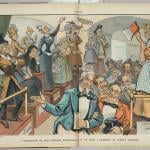In Tom’s schema (see p. 1181) Rom. 9.6-29 is seen as parallel in the chiasm to 11.1-32, and so he enumerates several themes found in both sections—both focus on the patriarchs and the promises made to them, both focus on the call and mercy of God, neither being dependent on works, both focus on the patience of God but also his hardening of people. And he adds, both use the term Israel in more than one way. This latter point is more than debatable, it’s probably wrong. Rom. 9.6 says “It is not as if the Word of God failed, for not all those ‘from’ Israel, these ones Israel”. In other words, Paul is not talking about two Israel’s he’s talking about some descendents from the one Israel no longer being part of Israel. As he will say later, ‘they’ve been broken off’ due to unbelief and misbehavior, among other things. So a good translation would be ‘not all those descendents of Israel are still Israelites, or not all those descendents of Israel constitute those who are Israel. Not two Israels, but one Israel and some broken off from it. And it might be well for me to emphasis here that Jesus is never said by Paul to be Israel. He did not come to be Israel but rather to free Israel, by being her Messiah and Savior. Jesus is said to be the seed of Abraham, and it is said that Gentiles become part of that seed by being grafted into the people of God by grace through faith, but Paul is not going to call either Jesus, or Jews and Gentiles united in Christ Israel, for two good reason; 1) God’s not finished with Israel yet; and 2) the majority of Israelites have not yet accepted Jesus. The furthest Paul will go is to suggest in Rom. 9-11 that Jewish Christians are the remnant or true Israelites, which ever way you want to put it, into which Gentiles are grafted. At any one time frame, there is only one true people of God, but God is not reneging on his promises to his original chosen people. It’s just that he is fulfilling them in Christ, now, and even more so at the eschaton. Why not more so now? Because now is the time for the full number of Gentiles to come into the one people of God.
I agree with Tom that Rom. 9-11 is not an abstract discussion of predestination, but rather a rehearsal of heilsgeschichte, especially so in Romans 9 and 11. I agree with him as well that Rom. 9 basically focuses on the past, Rom. 10 on the present, and Rom. 11 on the future. which is all the more reason why we should read these three chapters linearly not chiastically. I further agree that these chapters are primarily addressed to Gentile Christians in Rome, who may be puzzled about what is the truth about God and Israel. Further, he is right that much of what Paul says in Romans 9 could have been affirmed by any early Jew who knew Israel’s checkered past and full story (see p. 1188
Are then Gentiles being narrated into the story of Israel? That is Hays contention and Tom’s as well, or rather are they being integrated into this new entity called the ekklesia tou theou, which can be distinguished from the current (broken off) Israel of God, and the ekklesia is in fact the continuation of OT faithful Israel, the true descendents of Abraham, because, God’s people now are Jew and Gentile united in Christ, with the latter being grafted into the former? In other words, this matter is complex, but at the end of the day, Paul thinks non-Christian Israel still has a future, because Jesus will return one day and turn away the impiety of Jacob as the end of Rom. 11 says clearly. This would be totally unnecessary if either: 1) God had given up on Israel, or 2) Paul thought real Israel was the church, or 3) Paul thought the breaking off of those rejecting Christ was a once and for all time thing. Paul of course flatly denies the latter— he says God can graft them back in, and the breaking off is temporary. Gentiles have no reason to boast since they are wild olive branches unexpectedly grafted into the root (which is faithful Jewish followers of Jesus like Paul).
It is something of a surprise that Tom doesn’t spend some time dealing with the clearly corporate notions of election that Paul is using here. Election is in the first instance in Israel, and then in Christ, the Messiah of the Jews. Not all those in Israel will in the end be saved, for, as Paul makes clear some have made themselves vessels of wrath fit for the fire. In the use of foreknowledge language as well, Paul admits God foreknows even those Israelites who in the end choose apostasy rather than faithfulness. Foreknowledge does not guarantee salvation in advance, and for that matter neither does being chosen to be in Israel, chosen for the purpose of being a light to the nations. Election, as it turns out has to do with purpose, calling, ministry, and particularly in the OT, not mainly to do with what Christians meant by salvation. Furthermore, election ‘in Christ’ who is the elect one of God, is corporate as well It was Christ, not us, that was chosen before the foundation of the universe (see Ephes. 1– we didn’t exist to be chosen back then), to be the savior. Christ of course didn’t need to be saved himself, and yet he is the Elect One of God, proving once again, if further proof was needed that election is one thing, salvation is another. Salvation is by grace through faith in Jesus in the NT, as Rom. 10 says. But strangely, none of this is discussed up to and including p. 1190.
On p. 1191 Tom offers a translation of 9.22 that Cranfield quite rightly objected to. Tom has “God very patiently put up with the vessels of wrath created for destruction”. No, says Cranfield, the two clauses about the vessels of mercy and the vessels of wrath are not directly parallel. What the Greek says about the vessels of wrath is not that God created them for destruction, but rather that they ‘fitted themselves for destruction’, with no implication of God being the cause of this calamity at all. Thank goodness, or God’s goodness would itself be in question.
On p. 1192 Tom suggests that Paul wants to see the election of Israel through the lens of the election of the Messiah, and then he asks “Might it not be that Paul was determined now to understand the history and purpose of Israel in terms of the Messiah, not only as representative but as substitute?” I would say yes to the former, and no to the latter. Israel was not, as we have said in previous blog posts, called to be the savior of the world. The light of the world yes, but only God is the savior throughout the Bible. Thus Jesus’ savior role is not a fulfillment of the purpose and election of Israel. Indeed, the OT says nothing about salvation of the world in the Christian sense of everlasting life in Christ. Indeed, saved in the OT has the much more mundane senses of rescued from danger, delivered from disease, and the like. There is no negative side to election (namely God decomissioning some Israelites), and as I said, election in so far as it involves merely human beings is a corporate concept in both testaments and in neither does it guarantee anyone final salvation. Apostasy always lurks as a danger in both testaments.
It is more apt to stress that Jesus took the punishment for Israel’s sins on the cross (and everyone else’s too), and this being the case, it would be very surprising indeed, if Paul didn’t think Jews had a future both now and in the future through their Messiah. Why would they not if Jesus had already paid it all? Tom however is right that we can’t merely refer to the recital in Rom. 9 as salvation history, unless by that we mean the regular incursions of God breaking into human history to reconcile his people and even the world to himself. This story is not merely about historical development but also about divine intervention, repeatedly.
On p. 1193, it is saying too much to say that Messiah came and Israel as a whole rejected him. No, they did not, otherwise there would be no disciples to restore and rekindle on the other side of the cross. And it should be stressed, that all of the first Christians were Israelites. The Good News came to them first, and Paul says in Rom. 1 that was the ongoing plan and priority as well, because God was not finished with them yet. Furthermore, what would be the point of saying that God was making not Christian Jews jealous of the Gentiles who were now being saved, if it was not implied that they still had a chance in the future to rejoin the people of God? Answer— there would be no point in saying such a thing at all. If envy can’t result in repentance and final salvation, there is no point in mentioning it to the largely Gentile audience in Rome, who may have already thought too much of themselves and too little of Jews and Jewish Christians. At least we can end this post on a note of agreement with what Tom says on p. 1194, namely that the cross is where God’s righteousness and his love is most clearly revealed. Amen to that.











